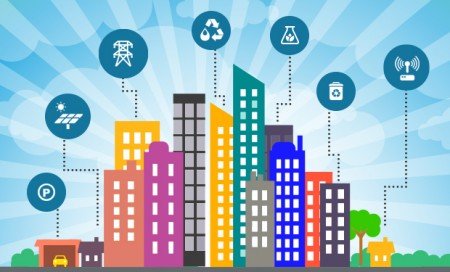
Lucknow, the capital of Uttar Pradesh, popular for its historical significance and culture, tops the second list of Smart Cities announced by the Urban Development Ministry, Government of India. It is a matter of immense pride for Lucknowites to have their city get world-class infrastructure facilities they have been waiting for. Lucknow obtaining the smart city status would enhance the city’s cultural, social and economic activities to a large extent.
Cities are engines of development and growth for the economy of a country and contribute tremendously to every nation’s GDP. In a highly populated country such as India, these urban areas contribute 64 percent of India’s GDP. With increasing urbanization, cities would contribute 74 percent of India’s GDP and house 42 percent of India’s population by the year 2030. This needs extensive development of economic, social, institutional and physical infrastructure. This is essential in attracting investments to the city and improving the overall quality of life, setting a cycle of development and growth.
However, there is immense pressure on infrastructure systems in the country, including transportation, roads, drainage and sewerage, water supply, electricity, uncollected solid waste, etc. The crumbling infrastructure has actually led to deterioration of city environments, and in many cities, problems of poverty, pollution, over population, traffic congestion, crime, sewage treatment and inadequate housing are leading to alarming proportions.
To overcome these problems and provide sustainable and clean environment along with inclusive development to its citizens, the Smart Cities Mission initiated by Government of India is a step in the right direction. The purpose of this mission is to improve quality of life and augment economic growth by developing the local area and harnessing technology, which leads to smart results.
 A typical Smart City in India would have the following features:
A typical Smart City in India would have the following features:
- Develop and preserve recreational spaces such as playgrounds and parks, reduce urban heat effects and promote eco-balance.
- Promote different types of transport options such as para-transport connectivity, transit oriented development (TDO) and public transport.
- Create walkable localities by refurbishing road network for cyclists and pedestrians and provide necessary administrative services within cycling or walking distance.
- Make governance cost-effective and citizen-friendly. It should rely more on e-governance to bring transparency and accountability.
- Provide efficient services to the citizens without having to visit municipal offices, forming e-groups to administer complaints and obtain feedback for quick redressal of those complaints.
- Promote economic and traditional activities of the city such as arts and craft, local cuisine, culture, heritage, tourism, textile, education, health, furniture, sports, and so on.
On the other hand, the central government would encourage the cities or state governments to add more Smart Solutions such as:
Energy Management and Eco-balance
- Installation of smart meters
- Energy-efficient green buildings
- Renewable energy
Urban Transportation
- Smart traffic management
- Smart parking
- Integrated multi-mode transport
Water Management
- Water quality monitoring
- Preventive maintenance and leakage identification
- Installation of smart water meters
On May 24, 2016, Union Urban Development Minister Venkaiah Naidu announced the second list of names of 13 more cities that would be developed under the Smart Cities Mission. Lucknow topped the list of Fast Track Competition winners, which was conducted for 23 cities. The City of Nawabs had missed the first list of 20 smart cities that was announced by the urban development ministry in January, 2016. However, Naidu said Lucknow improved the overall quality of its smart city program by 19 percent to make it to the coveted list this time around. Ongoing development projects such as Lucknow Metro Rail, IT City, Gomti riverfront development, Lucknow-Agra Expressway, to name a few, could have assisted Lucknow in securing a place in the list.
Lucknow District Magistrate (DM) Raj Sekhar credits this achievement to the several infrastructure development projects undertaken by the ruling Samajwadi Party (SP) in Lucknow and other districts in the state during the last one and a half year. Sekhar said that the development of metro rail, Gomti riverfront and Lucknow-Agra expressway is in full swing under the leadership of Chief Minister Akhilesh Yadav, and there will be new CNG buses and sanctioning of new CNG filling stations soon, which would make the environment clean and healthier.
To win the coveted smart city status, a specific area of the city needs to be developed holistically. Sekhar said that Qaiserbagh has been selected for comprehensive facilities and development for transport, e-governance, safety of citizens, proper parking, among others.
Dinesh Sharma, Mayor of Lucknow, who has been heading Lucknow Municipal Corporation (LMC) for the last 9 years, credited the local body for the accomplishment. Sharma said that LMC has improved significantly in areas of traffic management, road development and sanitation. The Mayor further added that LMC would draft an effective water policy and impose penalty on burning of waste outside and open defecation.
Though, the concept of Smart Cities is very interesting, it is quite challenging at the same time, considering providing regular quality services to lakhs pf people living in the city. It would require a combined effort of the government and people to make things happen and make Lucknow a Smart City in the real sense. Proper guidance and educating people on how to use and maintain the smart services properly can go a long way in maintaining and enhancing the charm and beauty of Lucknow, and once this is realized, it would be a delight to witness the old world charm and modernity that Lucknow would offer soon after becoming a Smart City.



Comment here